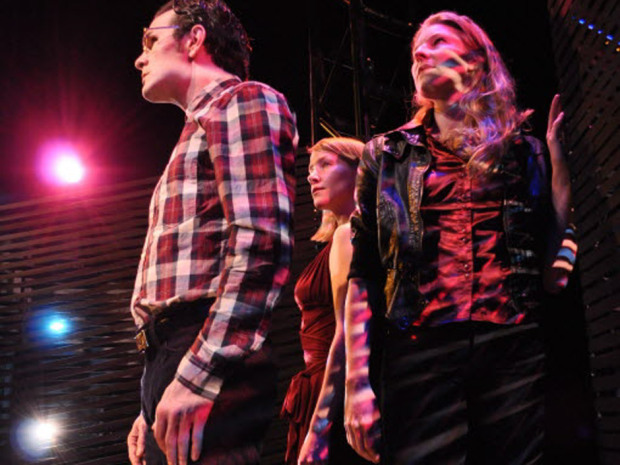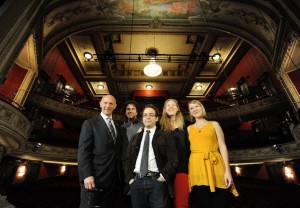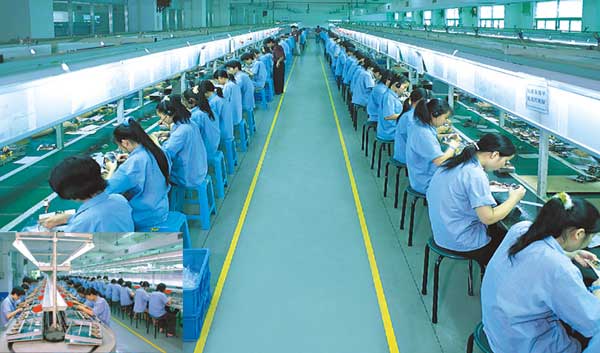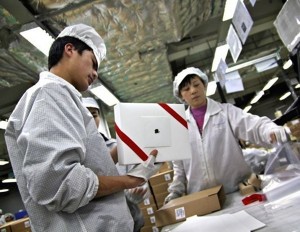
(l-r) Adam Wilson, Ava Jane Markus and Maev Beaty are directed by Mitchell Cushman in the SummerWorks darling turned Mirvish hit Terminus
by Michael Wheeler
I haven’t seen Terminus yet – going with my Mom next week. I don’t want that to stop me from writing about it here though, as we don’t do reviews in this space in any case.
It bears mentioning though that local indie theatre has created a genuine artistic and commercial hit, and that this comes in the form of Terminus. The production is the first show in a pretty big risk Mirvish is taking with their new indie-focused, Off-Mirvish season.
One of our most read and commented discussions this year was, Mirvish Blows Up Downtown Theatre in which I argued that A) A Mirvish interest in regularly and commercially producing the work of indie artists could be significant in an awesome way and B) the Mirvish re-development on King St had the potential to bring a net benefit to Torontonians and theatregoers if it included a smaller venue than the Princess of Wales, which will be demolished.
Since that post, The Off-Mirvish season has probably gone even better than anyone at Mirvish or their indie partner Outside The March could have imagined. It has received stunning reviews, social media buzz is at a fevered pitch and shows are selling out. Hope you don’t want to go this weekend Friday – as tickets are not available.
Anyone who has paid a casual interest in our industry knows it has been tough times as of late. Theatres are closing, deficits have been posted, boards are overstepping their mandate – questions of relevancy abound. To see a potential upswing, a positive sign that artist-driven independent work is viable and can excite not just our own community, but the city at large, is worth noting. Not only can this thing get turned around, we’re the ones who can do it.
Certainly there is value in much of the other work our community creates that is not commercially focused. God knows I wouldn’t be running this company with Aislinn and making this work if I didn’t think so, but what gives theatre its intrinsic value isn’t really what is at stake here. Theatre will always exist and address core questions of humanity as long as humans can get together somewhere. What’s at stake here is establishing a viable sustainable professionalized urban theatre industry.
If you remove the artists who work at our major non-urban festivals, that is something we don’t have in Toronto currently. Those artists that do work regularly here almost all have secondary focuses. By creating a regular link between independently produced and created work and commercial theatre, Mirvish threatens to redefine this paradigm. Not because we will work on Mirvish shows, but because it has the potential to reignite interest from audiences and other producers in what we do.
So hats off to Outside The March Artistic Director and recent Praxis blog writer Mitchell Cushman. We all really needed this to go well coming out of the gate, and you are passing off the baton with an early lead.

David Mirvish with the Terminus team

by Mitchell Cushman
In his best-selling biography of Steve Jobs, Walter Isaacson details at length the Apple founder’s infamous reality distortion field—his ability to “bend any fact to fit the purpose at hand”. Isaacson recounts how Jobs used this knack for re-purposing the truth in order to dream up seemingly impossible products, but also as a way of restructuring past experiences in a way that best suited whatever current narrative he was in the process of spinning. In this way as in others, Steve Jobs was a storyteller—a practitioner of theatre. And over the past two weeks, we have received a powerful reminder that monologuist Mike Daisey, creator of the play The Agony and the Ecstasy of Steve Jobs, is as well.
As new evidence has shown, Daisey has been employing his own reality distortion field, and has bent many a fact to fit his purpose. (I won’t list the embellishments here, but they have been everywhere in the news; for those interested, I would highly recommend listening to the March 16 episode of This American Life, “Retraction”). For Daisey, the purpose at hand has been inspiring North Americans into demanding better labour conditions at the Chinese factories that manufacture our various electronics. And to this end, Daisey has achieved a real measure of success. The New York Times and many other major news organizations have taken up the fight and Apple’s Foxconn factory has become a household name. In response to these pressures Apple and Foxconn announced this past week, in a landmark admission of corporate culpability, that they will be implementing a massive overhaul of their labour practices, hiring more workers, eliminating illegal overtime and substantially improving the safety protocols in the factory. A direct line can be drawn between the growing profile of Daisey’s play, and the attention surrounding its cause.
 Daisey’s ill-advised foray into journalistic territory—adapting his play for This American Life, appearing on various news outlets—has clouded the fact that he began by creating Agony as a piece of theatre, an art form in which invention is not only permissible, but kind of the point. When we attend a play, we are willingly offering ourselves up to be taken in, to suspend our disbelief, in order that we might connect to some underlying truth. This is exactly what Agony has done for its audiences. As host Ira Glass pinpointed during Daisey’s first appearance on This American Life a few months back, Daisey has done something “really kind amazing”, namely make people newly question an unjust system which on some level most of us have come to accept. “Which,” as Glass maintains “is really quite a trick, you really have to know how to tell a story to be able to pull something like that off.”
Daisey’s ill-advised foray into journalistic territory—adapting his play for This American Life, appearing on various news outlets—has clouded the fact that he began by creating Agony as a piece of theatre, an art form in which invention is not only permissible, but kind of the point. When we attend a play, we are willingly offering ourselves up to be taken in, to suspend our disbelief, in order that we might connect to some underlying truth. This is exactly what Agony has done for its audiences. As host Ira Glass pinpointed during Daisey’s first appearance on This American Life a few months back, Daisey has done something “really kind amazing”, namely make people newly question an unjust system which on some level most of us have come to accept. “Which,” as Glass maintains “is really quite a trick, you really have to know how to tell a story to be able to pull something like that off.”
Knowing how to tell a story means something very different in the theatre than it does in journalism. Daisey has publicly regretted and apologized for his conflation of the two, and any damage that this may have caused, either to the cause or to the journalistic organizations whom he let take his words as fact. The uncomfortable question to consider is, had Daisey not included these fabrications, had his show just rested on the staggering statistics documenting the inhuman working conditions, without any of the what we now know to be the theatricalized moments, without the disfigured line worker apocryphally calling Daisey’s iPad “magic” or without the imagined gun-toting factory guards, would the same call to action have resulted? Would Apple and Foxconn have been driven to publicly vow to do better? Or would we all simply have tuned out these numbers, and relegated them to the statistical scrapheap in the back of our minds? Is this an instance where theatrical storytelling, more so than journalistic reporting, has been necessary in order to prompt change?
We’re interested in examining these questions, and so we will be continuing forward with our upcoming production of The Agony and the Ecstasy of Steve Jobs, adapting the show to engage with this new level of narrative complication. We hope that you will come see our show in May, and sift through these many layers of distorted reality, even as, like with any worthwhile piece of theatre, we attempt to catch you up in them.
Outside the March, in association with Theatre Passe Muraille, presents:
The Agony and the Ecstasy of Steve Jobs
Adapted from the monologue by Mike Daisey
Starring David Ferry / Directed by Mitchell Cushman
Coming to Toronto May 2012, in a secret location near you
Ticket information to be released in early April.
Advanced ticket requests can be emailed to agony@outsidethemarch.ca






Recent Comments